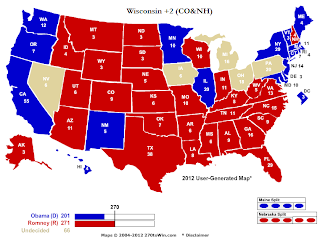The 2012 Presidential Election is exactly 2 weeks away. I'm pretty excited. At this point, I feel confident narrowing in on Romney's victory paths. I define a victory path as a set of swing states that provide just enough electoral votes to win.
As of this moment, I am assuming the following swing state rankings in terms of the likelihood of a Romney win (greatest to smallest): North Carolina, Florida, Virginia, Colorado, New Hampshire, Ohio, Iowa, Wisconsin, Nevada, Pennsylvania, and Michigan. While each state is a separate election, they tend to follow similar shifting patterns and loosely follow this ordering. That means, for example, that it is highly unlikely that Romney would win Pennsylvania and lose Florida. So, this allows me to make a couple safe assumptions:
- Romney will not win without North Carolina, Florida, and Virginia (all of which have been leaning slightly to Romney anyway).
- If Romney wins Pennsylvania or Michigan, he will have most likely already achieved a minimum path to victory with the more probable states, making both PA and MI ultimately unnecessary.



